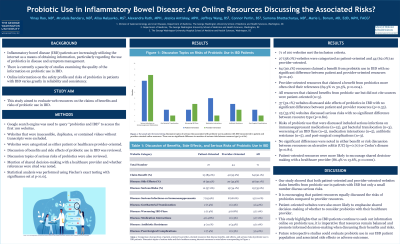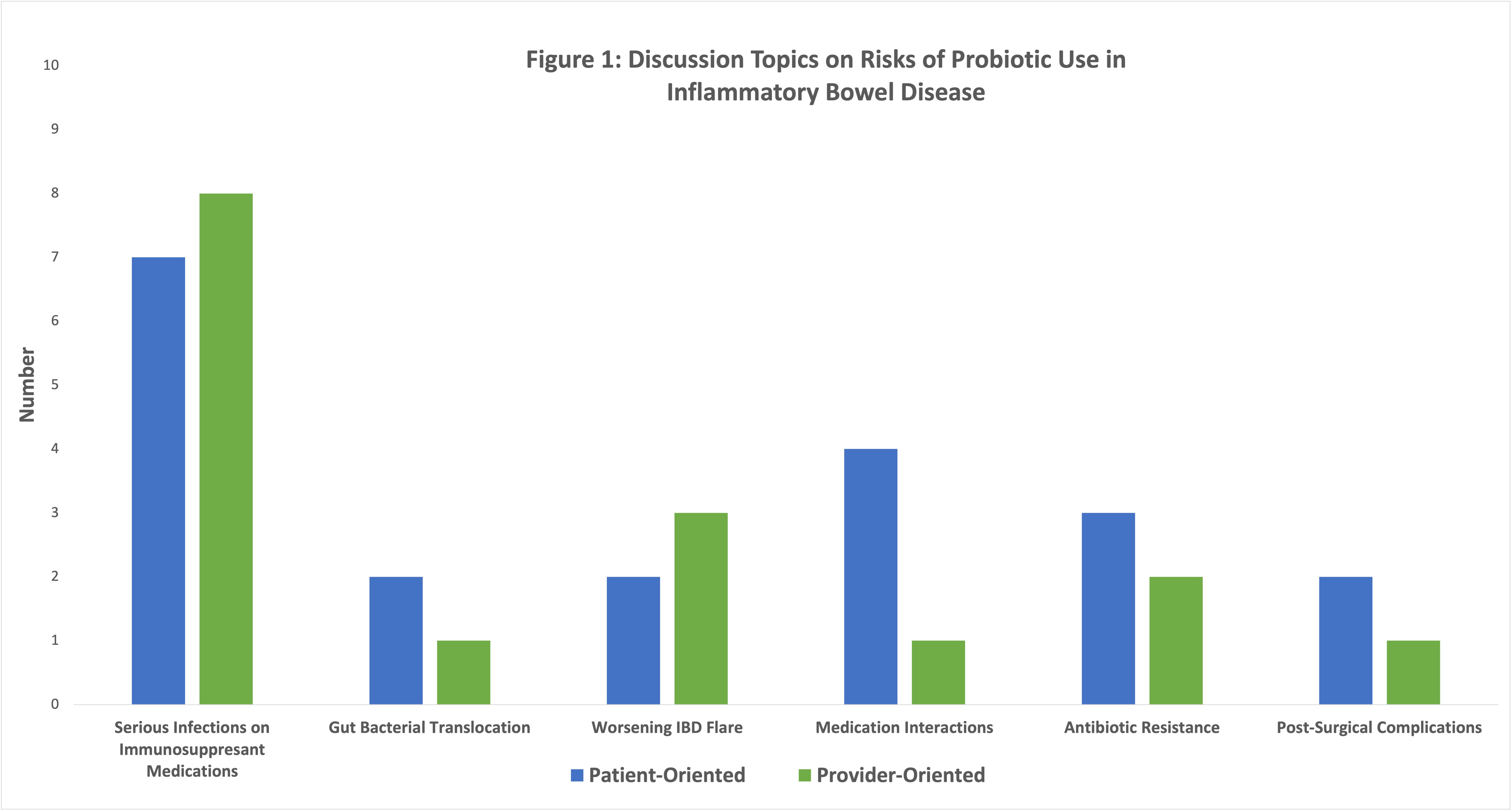Tuesday Poster Session
Category: IBD
P4261 - Probiotic Use in Inflammatory Bowel Disease: Are Online Resources Discussing the Associated Risks?
Tuesday, October 29, 2024
10:30 AM - 4:00 PM ET
Location: Exhibit Hall E

Has Audio

Vinay Rao, MD
George Washington University School of Medicine and Health Sciences
Washington, DC
Presenting Author(s)
Vinay Rao, MD1, Mrudula Bandaru, MD1, Alisa Malyavko, MS1, Alexandra Ruth, MPH2, Jessica Antiskay, MPH2, Jeffrey Y. Wang, BS3, Connor Perlin, BS4, Sumona Bhattacharya, MD1, Marie L.. Borum, MD, MPH, FACG1
1George Washington University School of Medicine and Health Sciences, Washington, DC; 2New Jersey Department of Health, Philadelphia, PA; 3The George Washington University School of Medicine and Health Sciences, Washington, DC; 4George Washington University School of Medicine and Health Sciences, Arlington, VA
Introduction: Inflammatory bowel disease (IBD) patients are increasingly utilizing the internet as a means of information, particularly regarding the use of probiotics in disease and symptom management. Online information varies in reliability, particularly regarding the risks of probiotics. This study aimed to evaluate web resources on the claims of benefits and risks of probiotic use in IBD.
Methods: Google search engine was used to query “probiotics and IBD” to access the first 100 websites. Websites that were inaccessible, duplicates, or videos without transcripts were excluded. Websites were categorized as patient or provider-oriented. Discussion of benefits, side effects, and serious risks was reviewed. Discussion of shared decision-making and references cited was noted. Statistical analysis was performed using Fischer’s exact testing with significance set at p< 0.05.
Results: 71 of 100 websites met inclusion criteria. 27 (38.0%) were patient-oriented and 44 (62.0%) provider-oriented. 64 (90.1%) claimed a benefit from probiotic use in IBD with no significant difference between patient and provider resources (p=0.42). Provider resources that claimed a benefit from probiotics more often cited references (69.5% vs 30.5%, p=0.004); all resources that claimed benefits but did not cite any sources were patient-oriented (n=5). 37 (52.1%) websites discussed side effects of probiotics in IBD and 25 (35.2%) discussed serious risks; no significant difference was noted between resource type (p=0.33 and 0.80, respectively). Risks of probiotic use discussed included serious infections on immunosuppressant medications (n=15), gut bacterial translocation (n=3), worsening IBD flare (n=5), medication interactions (n=5), antibiotic resistance (n=5), and post-surgical complications (n=3). No significant differences were noted in benefit or risk discussion between resources on UC or CD (p=0.70 and 0.81, respectively). Patient-focused resources were more likely to encourage shared decision-making with a provider (86.4% vs 13.6%, p=0.0001).
Discussion: Our study showed that both patient and provider-oriented websites claim probiotic benefits in IBD but only a small number discuss serious risks. It is encouraging that patient resources equally discussed probiotic risks compared to provider resources and were more likely to emphasize shared decision-making. As IBD patients seek out information online on probiotic use, it is important that resources remain balanced and promote informed and patient-centered decisions.

Disclosures:
Vinay Rao, MD1, Mrudula Bandaru, MD1, Alisa Malyavko, MS1, Alexandra Ruth, MPH2, Jessica Antiskay, MPH2, Jeffrey Y. Wang, BS3, Connor Perlin, BS4, Sumona Bhattacharya, MD1, Marie L.. Borum, MD, MPH, FACG1. P4261 - Probiotic Use in Inflammatory Bowel Disease: Are Online Resources Discussing the Associated Risks?, ACG 2024 Annual Scientific Meeting Abstracts. Philadelphia, PA: American College of Gastroenterology.
1George Washington University School of Medicine and Health Sciences, Washington, DC; 2New Jersey Department of Health, Philadelphia, PA; 3The George Washington University School of Medicine and Health Sciences, Washington, DC; 4George Washington University School of Medicine and Health Sciences, Arlington, VA
Introduction: Inflammatory bowel disease (IBD) patients are increasingly utilizing the internet as a means of information, particularly regarding the use of probiotics in disease and symptom management. Online information varies in reliability, particularly regarding the risks of probiotics. This study aimed to evaluate web resources on the claims of benefits and risks of probiotic use in IBD.
Methods: Google search engine was used to query “probiotics and IBD” to access the first 100 websites. Websites that were inaccessible, duplicates, or videos without transcripts were excluded. Websites were categorized as patient or provider-oriented. Discussion of benefits, side effects, and serious risks was reviewed. Discussion of shared decision-making and references cited was noted. Statistical analysis was performed using Fischer’s exact testing with significance set at p< 0.05.
Results: 71 of 100 websites met inclusion criteria. 27 (38.0%) were patient-oriented and 44 (62.0%) provider-oriented. 64 (90.1%) claimed a benefit from probiotic use in IBD with no significant difference between patient and provider resources (p=0.42). Provider resources that claimed a benefit from probiotics more often cited references (69.5% vs 30.5%, p=0.004); all resources that claimed benefits but did not cite any sources were patient-oriented (n=5). 37 (52.1%) websites discussed side effects of probiotics in IBD and 25 (35.2%) discussed serious risks; no significant difference was noted between resource type (p=0.33 and 0.80, respectively). Risks of probiotic use discussed included serious infections on immunosuppressant medications (n=15), gut bacterial translocation (n=3), worsening IBD flare (n=5), medication interactions (n=5), antibiotic resistance (n=5), and post-surgical complications (n=3). No significant differences were noted in benefit or risk discussion between resources on UC or CD (p=0.70 and 0.81, respectively). Patient-focused resources were more likely to encourage shared decision-making with a provider (86.4% vs 13.6%, p=0.0001).
Discussion: Our study showed that both patient and provider-oriented websites claim probiotic benefits in IBD but only a small number discuss serious risks. It is encouraging that patient resources equally discussed probiotic risks compared to provider resources and were more likely to emphasize shared decision-making. As IBD patients seek out information online on probiotic use, it is important that resources remain balanced and promote informed and patient-centered decisions.

Figure: Figure 1: Discussion topics of risks of probiotic use in inflammatory bowel disease comparing patient and provider-oriented resources.
Disclosures:
Vinay Rao indicated no relevant financial relationships.
Mrudula Bandaru indicated no relevant financial relationships.
Alisa Malyavko indicated no relevant financial relationships.
Alexandra Ruth indicated no relevant financial relationships.
Jessica Antiskay indicated no relevant financial relationships.
Jeffrey Wang indicated no relevant financial relationships.
Connor Perlin indicated no relevant financial relationships.
Sumona Bhattacharya: Johnson & Johnson – Advisor or Review Panel Member.
Marie Borum: Takeda Pharmaceuticals – Consultant, Speakers Bureau.
Vinay Rao, MD1, Mrudula Bandaru, MD1, Alisa Malyavko, MS1, Alexandra Ruth, MPH2, Jessica Antiskay, MPH2, Jeffrey Y. Wang, BS3, Connor Perlin, BS4, Sumona Bhattacharya, MD1, Marie L.. Borum, MD, MPH, FACG1. P4261 - Probiotic Use in Inflammatory Bowel Disease: Are Online Resources Discussing the Associated Risks?, ACG 2024 Annual Scientific Meeting Abstracts. Philadelphia, PA: American College of Gastroenterology.
